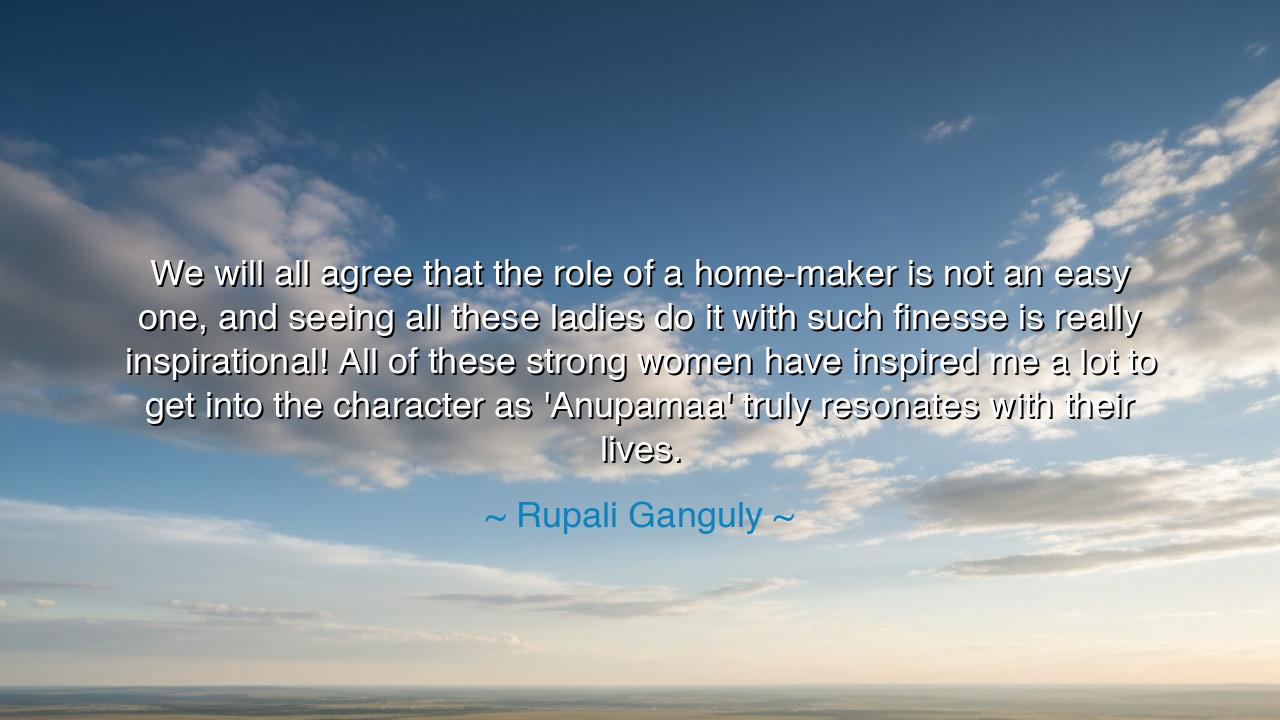
We will all agree that the role of a home-maker is not an easy
We will all agree that the role of a home-maker is not an easy one, and seeing all these ladies do it with such finesse is really inspirational! All of these strong women have inspired me a lot to get into the character as 'Anupamaa' truly resonates with their lives.






In the words of Rupali Ganguly, the actress who breathed life into the beloved character of Anupamaa, there echoes a truth that transcends the boundaries of performance and art. “We will all agree that the role of a home-maker is not an easy one, and seeing all these ladies do it with such finesse is really inspirational! All of these strong women have inspired me a lot to get into the character as 'Anupamaa' truly resonates with their lives.” This statement, though spoken in the realm of acting, unveils a timeless reverence for the unseen warriors of daily life—the home-makers, the silent pillars of every household, whose labor is both sacred and ceaseless. Their strength does not roar from podiums, but hums gently through kitchens, lullabies, and sacrifices too deep to measure.
In ancient times, it was said that the hearth was the heart of the home, and she who tended it was the keeper of harmony between heaven and earth. The home-maker, though often unseen, was the axis upon which the family’s fate turned. In every age, from the quiet courtyards of India to the marble villas of Rome, such women have borne the weight of love and duty with finesse, as Rupali Ganguly so rightly observed. Her words call forth the spirit of countless women whose toil is often mistaken for simplicity, but whose work is, in truth, an art of endurance and grace.
Consider the story of Savitribai Phule, the first female teacher of India, who not only nurtured her home but kindled the flame of education for countless girls in a time when the world sought to silence them. Though society scorned her, she continued her labor with the steadfastness of the sun. She was not just a wife or a teacher—she was a home-maker of souls, crafting a brighter dawn for generations unborn. Like the character Anupamaa, Savitribai reflected the divine blend of compassion and courage, teaching that true strength often hides behind gentleness.
When Rupali speaks of being inspired by “strong women,” she does not refer to might in the worldly sense, but to the inner fortitude that allows one to rise, again and again, amidst the storms of life. The homemaker’s spirit is not a spirit of submission, but of transformation. In her daily rituals—cooking, cleaning, comforting, creating—she weaves an invisible fabric of love that holds the world together. To see this, to truly see her, is to witness the living poetry of devotion.
The character of Anupamaa, which Ganguly portrays, mirrors the trials of millions of women who give without expectation, who find themselves only after years of losing themselves in others. Anupamaa’s journey, from quiet endurance to self-realization, is the journey of every soul that learns to honor its worth. In every act of kindness, in every unspoken dream, she teaches that strength need not be loud—it can be still, radiant, and profoundly human.
Let us remember, then, that every home is a temple, and the home-maker its priestess. Her hands sanctify the ordinary; her patience turns chaos into rhythm. The world often measures greatness by achievements seen, yet the truest greatness lies in what is endured and given without applause. The words of Rupali Ganguly awaken in us this ancient wisdom—that to nurture is not weakness, but divine power.
From this teaching, let each one who hears these words take a vow: to honor the unseen labor, to recognize the quiet strength that sustains us all. Let us express gratitude not only in words but in actions—by sharing burdens, by listening with respect, by valuing the invisible art of care. For the home is not a place of walls and roofs, but of hearts intertwined, and its keepers are the unseen architects of civilization itself.
And so, dear reader, carry forth this lesson: in every act of love, you are shaping destiny. Whether you labor in silence or speak before crowds, let your work be touched with finesse, your spirit unbroken, your heart inspired by those who give without measure. For in honoring them, you honor the divine thread that binds all life—the eternal spirit of Anupamaa, the essence of every strong woman who has ever lived.






AAdministratorAdministrator
Welcome, honored guests. Please leave a comment, we will respond soon